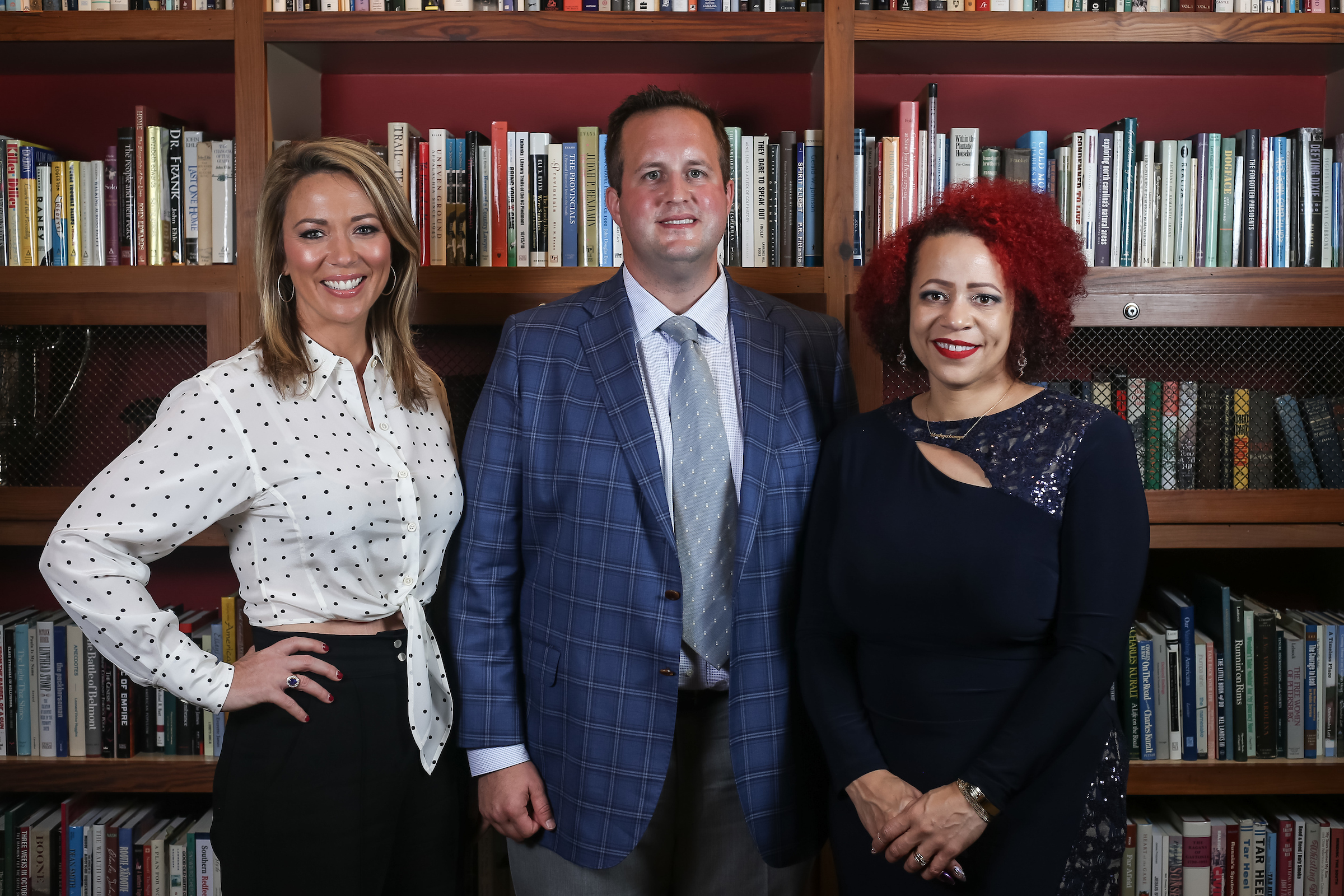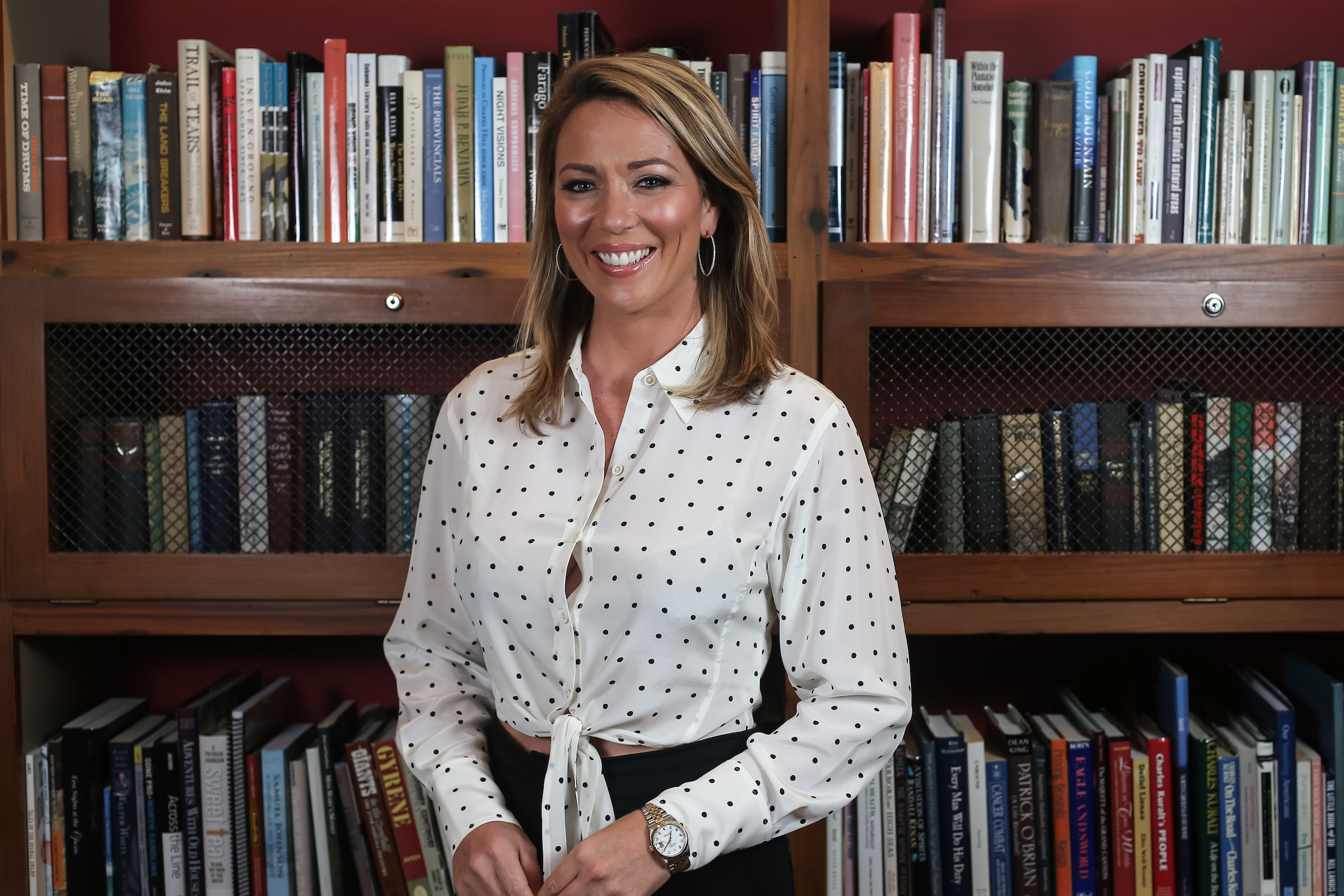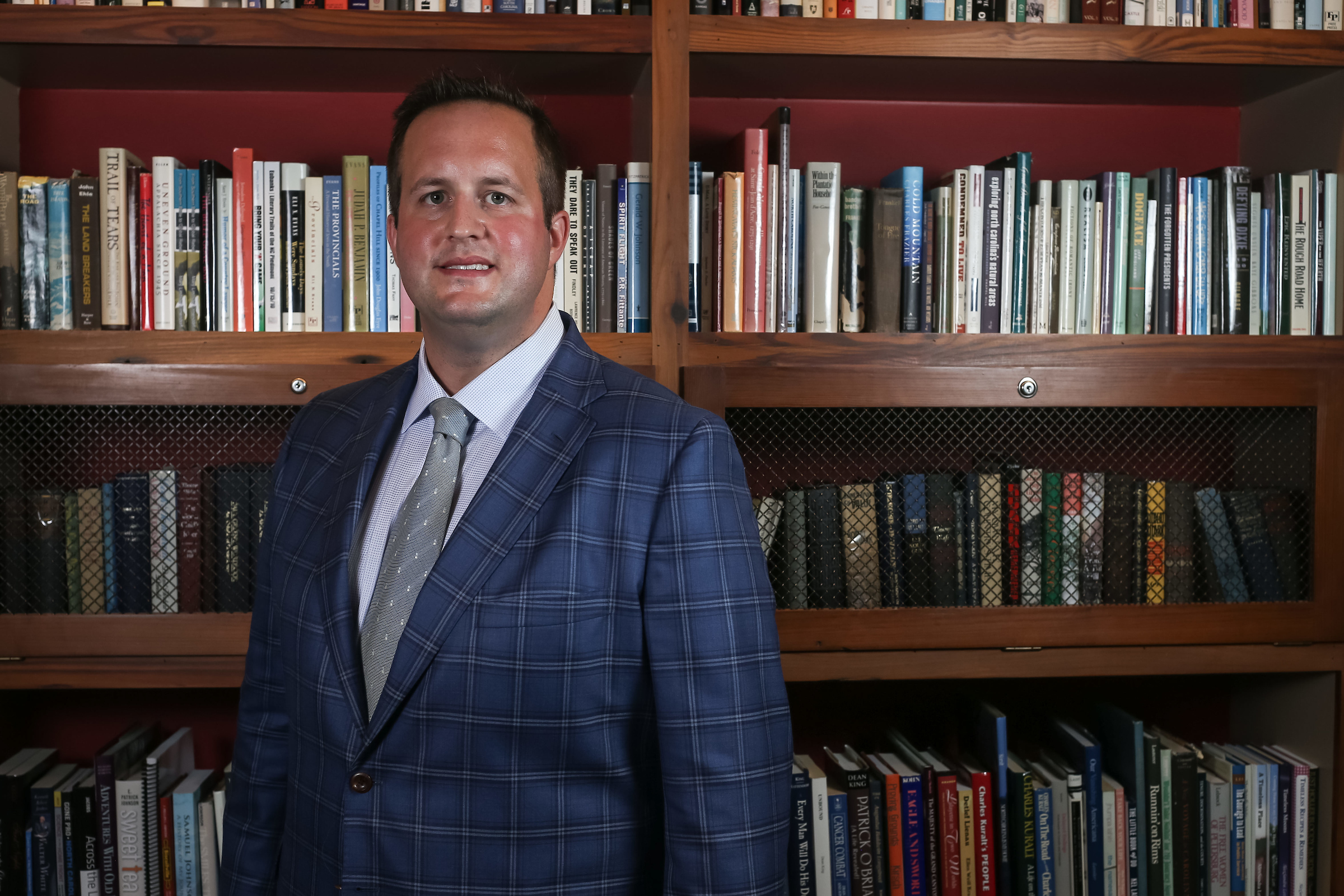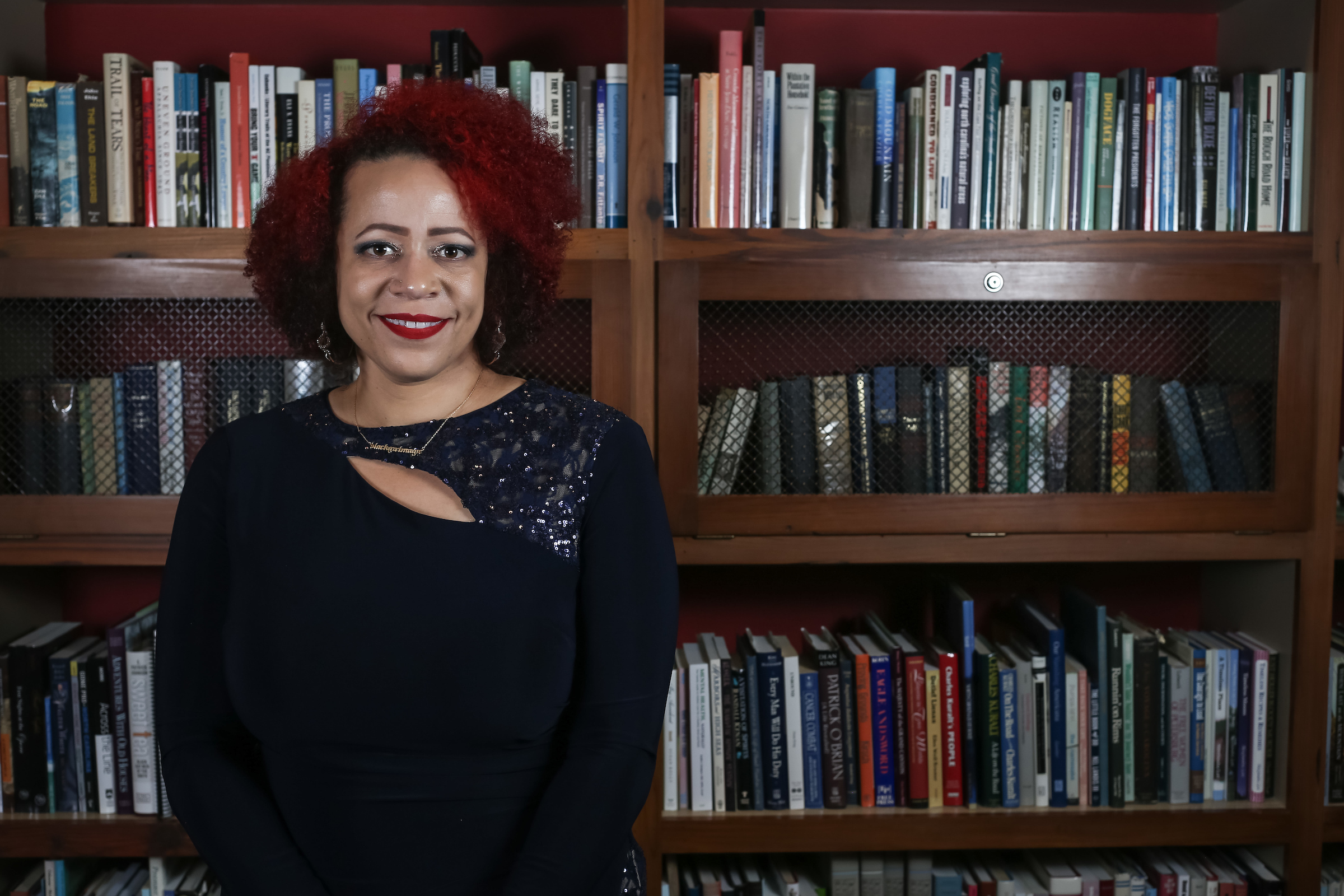GAA Honors Three Young Alumni
Posted on Oct. 13, 2017
The GAA’s 2017 Distinguished Young Alumni Award recipients: Brooke Baldwin ’01, left, Nicholas Black ’13 (MBA) and Nikole Hannah-Jones ’03 (MA). (Photo by Ray Black III)
The GAA recognized two journalists and a nonprofit entrepreneur with its Distinguished Young Alumni Awards on Friday. The 2017 recipients are:
- Brooke Baldwin ’01, of New York, TV anchor for CNN’s afternoon news show;
- Nicholas Black ’13 (MBA), of Mount Pleasant, S.C., founder of entrepreneurial nonprofits; and
- Nikole Hannah-Jones ’03 (MA), of Brooklyn, N.Y., award-winning education features writer for The New York Times Magazine.
The awards were presented by the GAA Board of Directors at its fall meeting. The GAA has given the awards since 1989, recognizing alumni age 40 or younger at the time of their selection for bringing credit to the University through their achievements.
Brooke Baldwin: ‘Command and Control’
When CNN executive producer Eric Hall refers to anchor Brooke Baldwin as “a Swiss army knife of talent,” he’s talking about her ability to connect with a range of audiences, to shift emotions seamlessly from a heart-warming human-interest piece to a straight news report to a gut-wrenching breaking-news story. She also taps her breadth of knowledge to ask incisive questions of policy wonks or other experts.

Brooke Baldwin ’01 (Photo by Ray Black III)
Baldwin also remembers the variety of skills she employed in her early days in broadcasting, when she would write the newscast script and then scroll the teleprompter with her foot under the desk to deliver it on air. She knows all too well the bumpy road from those do-it-yourself days to the glass tower of New York’s Time Warner Center, where she hosts the mid-afternoon shift of CNN Newsroom.
“Every day I walk into CNN and know that I am so lucky to have landed in a career path that totally jibes with who I am and what I love,” Baldwin said.
She almost didn’t take that path. On her way back to the College of William & Mary as a sophomore, she dropped a friend off in Chapel Hill. On impulse, she took a tour of the campus, and by the start of her junior year, she was enrolled in Carolina’s journalism school.
Another redirect came in the spring semester of her senior year, when Baldwin was the camerawoman for UNC-TV’s news show. Dana Rosengard ’02 (PhD), then a teaching assistant, pulled her aside: You belong in front of the camera, he said, not behind it.
“Brooke had a visual maturity about her,” Rosengard said. “She has a certain presence. … Brooke has never been average on the anchor desk. There is something about her presence, poise, command and control.”
Baldwin has covered top stories of the day, such as the shootings at an elementary school in Connecticut, the bombing at the Boston Marathon, a terrorist driving a truck through a crowd in France, the wars in the Middle East and the 2016 presidential campaign.
Baldwin was nominated for a Peabody Award after hosting a town-hall-style meeting of 40 people touched by gun violence. Twice she has been part of a Peabody Award-winning team at CNN — once for coverage of the 2008 presidential election and another time for the BP oil spill in the Gulf of Mexico. She won two Emmys as part of a news team covering breaking news. In 2012, the New York Festivals International Television & Film Awards bestowed on her its Silver World Medal for Best Investigative Report for her first hour-long documentary, To Catch a Killer.
Video: Watch Baldwin’s keynote address at UNC’s 2017 Commencement.
Nicholas Black: Mission Driven
Nothing builds leadership like holding in your hands the lives of hundreds of soldiers and the civilians surrounding their mission. A Ranger-qualified captain, platoon leader and battalion fire-support officer for the 173rd Airborne Brigade Combat Team, Nicholas Black fired 100 tons of ordnance in combat during his 27 months in Afghanistan — and without a single civilian casualty.

Nicholas Black ’13 (MBA) (Photo by Ray Black III)
But while he completed his service with medals for valor and effectiveness, he saw that others had survived the battlefield only to bring home psychological trauma and issues with substance abuse, some so severe that they killed themselves.
Re-entering civilian life in 2011, Black partnered with two other veterans to found Stop Soldier Suicide, a nonprofit dedicated to preventing suicide among soldiers leaving the military and ensuring that veterans get other kinds of help. The national organization has more than 700 clients receiving case-management services and connects by phone and email to thousands more.
Founding partner Brian Kinsella said that with Black, “no mission is too big; no obstacle too small. He’ll find a way to make it happen. … People connect with him, and he connects with people.”
Black had applied to Kenan-Flagler Business School while deployed in Afghanistan, contacting Bob Connolly, an associate professor of finance who sent care packages — and Kenan-Flagler coffee mugs — to U.S. soldiers in combat areas. Black distinguished himself in his MBA program, receiving the Rollie Tillman Jr. Outstanding Leadership Award and being selected as a Kenan Institute Leadership Fellow.
“Nick was a paratrooper,” Connolly said, “and they’re not quiet sorts. Nothing is halfway, ever. If you’re going to do it, do it big. That’s his approach to everything.”
Once Stop Soldier Suicide was established well enough to hire staff, Black looked for other nonprofit ideas.
“Innovation sometimes is taking an idea or solution from one industry and applying it to another,” Black said. With two of his classmates from Johns Hopkins University, he organized Victory Social Capital, seeing the potential to scale a nonprofit through a public-private partnership investment model. His team restructured a 500-person therapeutic community that led to an additional $8 million in public investment.
Black showed his entrepreneurial flexibility when one effort didn’t work out because of customer-service issues beyond its control. The business evolved into the nonprofit GoodUnited, where he is CEO. The venture-backed startup uses automated email-personalization technology to bring donors and nonprofits together, similar to the Pandora music-streaming service but for philanthropists, using technology to suggest what they might want to do next, based on their previous interactions.
“I’m really good at chasing problems,” Black said. “I’m good at learning, not through being smart but by running into walls, experiencing things and getting better.”
It’s all part of an ongoing mission.
“The ultimate driver,” Black said, “is thinking about guys I served with who don’t have the opportunity to do what I’m doing. That’s a constant reminder for me to take that risk, because they can’t.”
Nikole Hannah-Jones: It’s Personal, for Her and for Readers
Nikole Hannah-Jones and her husband, Faraji, disagreed about where to send their daughter to school. What for most couples would have remained a private family matter instead played out in a long feature in The New York Times Magazine, where she is a staff writer focusing on racial segregation in schools.

Nikole Hannah-Jones ’03 (MA) (Photo by Ray Black III)
The debate over whether to enroll their daughter in a majority black school or majority white school forced Hannah-Jones and her husband to turn theory into practice. She laid out her own experiences as a black child in a predominantly white school in Iowa, and the history of segregation in the North and in the New York City public schools. Her story won the National Magazine Award and other recognitions.
NYT Magazine Editor Ilena Silverman said she heard from a parent a year later who was using the story to help make the best decision for her child. “The story still had relevance,” Silverman said. “As an editor, that’s exciting. You hope the things you publish may change policy or cultural understanding.”
For work with such personal appeal and societal impact, the MacArthur Foundation this week named her a MacArthur Fellow, more commonly known as the “genius grants.”
After majoring in history and black studies at Notre Dame, Hannah-Jones accepted a Park Fellowship at UNC’s journalism school for her master’s. In The News & Observer’s Durham bureau, she covered education and realized that while school segregation was at the root of almost every inequality in society, “most reporters were not covering it.”
“I felt it was important. If you were going to write about the achievement gap and racial and economic inequality and you ignored the fact that schools were getting increasingly segregated, you weren’t doing your job.”
Her reporting dug deeply into data and provided historical context. At The Oregonian in Portland, she covered civil rights, segregation, fair housing and economic justice. She remained focused on those issues when she moved on to the investigative journalism site ProPublica and then The NYT Magazine.
Hannah-Jones received a Peabody Award in 2016 for her episode of the public radio show This American Life addressing school desegregation and the achievement gap between black and white students; “The Problem We All Live With” took its title from a 1964 Norman Rockwell painting depicting a small black girl being guarded by U.S. marshals as she goes to an integrated school. Among many other accolades, the National Association of Black Journalists named her Journalist of the Year, and The Root magazine listed her among its 100 Most Influential African-Americans.
Hannah-Jones has co-founded a training and mentorship organization to increase the number of investigative reporters of color. The Ida B. Wells Society, named for an African-American journalist in the late 1800s who crusaded against lynchings, recently celebrated its first anniversary and has more than 700 members.
Hannah-Jones is on leave from the Times to write a book that traces the struggle of equal education for black children since slavery.
Video: Hannah-Jones talks about her work in a video for the MacArthur Foundation.
Audio: Listen to “The Problem We All Live With” on This American Life.
— Nancy E. Oates
More online…
- The Accidental Educator: Preston Smith ’01 was led off the stage at his high school graduation after making a spectacle. At Carolina, he came to understand the value of making one every day. From the March/April 2017 Carolina Alumni Review
- GAA Honors Two Entrepreneurs With Distinguished Young Alumni Awards
October 2016 news report - The Crowd She Runs With: Danae Ringelmann ’00 quickly spotted the roadblocks in traditional finance, and she found a way to give every entrepreneur — and every bright idea — a shot at success. From the July/August 2016 Carolina Alumni Review
- Not Monkeying Around: Profile of John Sides ’96, political science professor and founder of The Monkey Cage data-based political blog, from the May/June 2016 Carolina Alumni Review
- Between the Lines: Blending kitchens and newsrooms to create a career — Profile of Hunter Lewis ’00, editor of Cooking Light magazine, from the March/April 2016 Carolina Alumni Review
- GAA Honors Three With Distinguished Young Alumni Awards
October 2015 news report
- Nonprofit Leaders, Military Officer Receive GAA Award for Young Alumni
October 2014 news report - Callie Brauel ’09, one of seven alumni featured in “Change Agents,” featuring alumni who’ve tackled some of the world’s biggest problems. From the May/June 2012 Carolina Alumni Review
- Two Receive GAA’s 25th Annual Young Alumni Awards
October 2013 news report - Soul Catcher: Stuart Albright’s journey of self-discovery has launched many, many others in his classroom and on the playing field — Profile of Stuart Albright ’01 from the January/February 2013 Carolina Alumni Review
- Conflicts, Near and Far: International reporting takes former DTH editor to world’s hot spots — Profile of Thanassis Cambanis ’96, from the March/April 2011 Carolina Alumni Review
- Previous award recipients are listed here; detailed coverage is available from the Carolina Alumni Review; reports from the most recent five years are in the GAA’s members-only area of the website while previous issues of the Review are open to all.
- GAA Honors NFL Player for Serving Off the Field
April 2013 news report - Nonprofit Founder, Comedy Writer Receive GAA’s Award for Young Alumni
- October 2012 news report
- Educator Receives GAA’s Award for Young Alumni
October 2011 news report - Author Receives GAA’s Award For Young Alumni
April 2011 news report - Two From ’93 Receive GAA’s Award For Young Alumni
October 2010 news report - GAA Honors Three With Distinguished Young Alumni Awards
October 2009 news report - Service at Heart of GAA’s Recognition of Two Young Alumni
October 2008 news report - Two ’93 Graduates Receive GAA’s Distinguished Young Alumni Awards
October 2007 news report - Global Visionaries: GAA Honors Two Alumni Who Make a Difference
October 2006 news report - GAA Honors ESPN Anchor, Principal and Teacher
October 2005 news report - Three Win Distinguished Young Alumni Award
October 2004 news report
